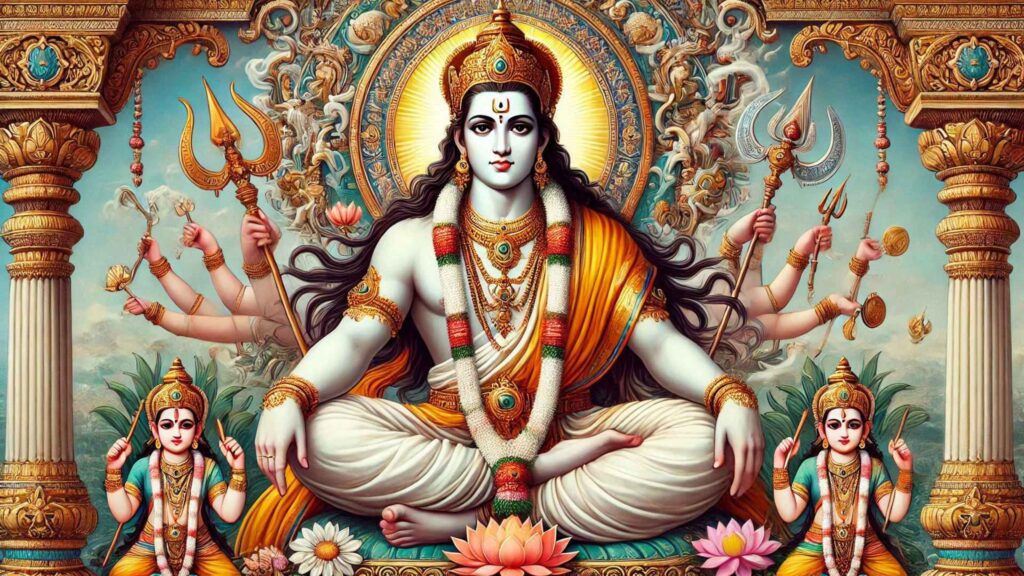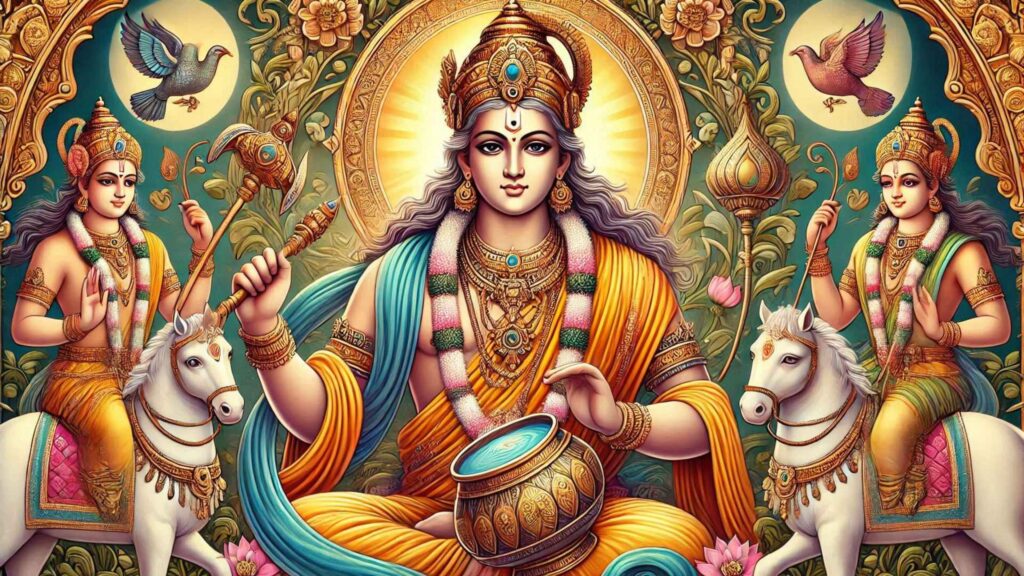Dhanvantari: The Divine Physician and God of Ayurveda
Introduction
Brief Overview of Dhanvantari in Hinduism
Dhanvantari is a revered deity in Hinduism known as the God of Ayurveda, the ancient Indian system of medicine. He emerged from the ocean during the churning of the cosmic ocean (Samudra Manthan), bearing the pot of nectar (amrita) that grants immortality. As the celestial healer, Dhanvantari is worshipped as the source of all medicinal knowledge and the protector of health and well-being.
Read More About Deities And Gods
Significance of Dhanvantari in Daily Hindu Life
Dhanvantari holds a special place in Hindu households, especially for those seeking good health and longevity. His teachings form the foundation of Ayurveda, which emphasizes harmony between mind, body, and spirit. Devotees pray to him for recovery from illness, overall wellness, and guidance in maintaining a balanced life.
Cosmic and Spiritual Importance
Dhanvantari represents the healing aspect of the divine, symbolizing the interplay of physical health and spiritual well-being. His appearance with the nectar of immortality underscores the importance of Ayurveda in achieving a harmonious and fulfilled life. Spiritually, he embodies the pursuit of balance and the eradication of suffering.
Names and Etymology

Meaning of Dhanvantari
The name “Dhanvantari” is derived from Sanskrit:
- Dhanvan (धन्वन्): Referring to a desert or wilderness, symbolizing the hardships of life.
- Tari (तारि): Meaning “to cross,” signifying Dhanvantari’s role in helping individuals overcome ailments and obstacles.
Other Names of Dhanvantari
- Amrita-Dhara: The bearer of nectar, emphasizing his role in granting immortality.
- Vaidyanatha: Lord of physicians, reflecting his healing abilities.
- Arogya-Natha: The lord of health and wellness.
- Sudarshana Vaidya: The divine healer who also wields the Sudarshana Chakra.
- Bhishak: The physician, representing his role in curing diseases.
Each name highlights a unique facet of Dhanvantari’s divine responsibilities and attributes.
Symbolism and Iconography

Physical Description and Meaning
Dhanvantari is depicted as a radiant deity with four arms. He holds:
- Amrita Kalasha (Pot of Nectar): Represents immortality and the essence of life.
- Shankha (Conch): Symbolizes purity and the sacred sound of creation.
- Chakra (Disc): Denotes his connection with Lord Vishnu and his power to protect.
- Herbs or Scriptures: Signifying his role as the originator of Ayurveda.
He is often shown standing on a lotus, symbolizing purity and divine knowledge.
Symbolism
- Pot of Nectar: Represents the healing power of Ayurveda and the balance of life energies.
- Lotus: Reflects detachment and spiritual growth.
- Golden Hue: Signifies vitality, health, and divine radiance.
The Flower Connection
Sacred flowers like tulsi and marigold are associated with Dhanvantari, symbolizing purity and health. These flowers are commonly offered during prayers.
Colors and Symbols
- Colors: Gold and green dominate his imagery, representing vitality and natural healing.
- Symbols: Herbs, the pot of nectar, and the lotus emphasize his healing and nurturing aspects.
Mythology and Stories

Birth Story
Dhanvantari emerged during the churning of the ocean (Samudra Manthan), a collaborative effort between the devas (gods) and asuras (demons) to extract the nectar of immortality. He appeared holding the pot of nectar and offered it to the devas, ensuring their immortality and victory over the asuras.
Stories and Spouses
Dhanvantari is considered an incarnation of Lord Vishnu, emphasizing his divine role in preserving life. Although there are no specific mentions of a consort, he is revered in association with the healing energies of nature and Ayurveda.
Connection with Other Deities
Dhanvantari is closely connected to Lord Vishnu as his incarnation. His healing role complements the nurturing aspects of Lakshmi (prosperity) and the wisdom of Saraswati (knowledge).
Role in Ramayana and Mahabharata
While Dhanvantari does not have a direct role in these epics, his principles of Ayurveda and healing are reflected in the practices and treatments described, such as the use of herbs and elixirs in battles.
Famous Blessings and Boons
Dhanvantari grants health, longevity, and protection from diseases. His blessings are sought for mental, physical, and spiritual well-being.
Spiritual Significance
A Visible Form of God
Dhanvantari represents the divine in the form of a healer, guiding humanity toward a balanced and harmonious existence.
Representation of Knowledge and Enlightenment
His association with Ayurveda symbolizes the pursuit of holistic knowledge that nurtures both the body and the spirit.
Connection to Spiritual Awakening
Healing the body is seen as a step toward spiritual awakening, as it removes obstacles that hinder meditation and inner growth.
Role in Yoga and Meditation Practices
Dhanvantari’s teachings emphasize the integration of diet, lifestyle, and mindfulness in yoga and meditation practices for overall well-being.
The Mantra Connection
Chanting “Om Namo Bhagavate Vasudevaya Dhanvantaraye Amrita Kalasha Hastaya Sarva Bhaya Vinashaya Sarva Roganivaranaya Namaha” invokes Dhanvantari’s blessings for healing and protection.
Worship and Rituals
Benefits
Worshiping Dhanvantari promotes physical and mental health, helps in overcoming chronic ailments, and ensures a balanced life.
Daily Worship Practices
Devotees offer tulsi leaves, fruits, and sacred water while reciting his mantras. Meditation on his form enhances mental clarity and healing.
Best Times for Worship
- Dhanteras: Celebrated two days before Diwali, this festival honors Dhanvantari as the harbinger of health and prosperity.
- Thursdays: Associated with spiritual and health-related practices.
Important Festivals
- Dhanteras: Dedicated to Dhanvantari, marking the significance of health and well-being.
- Ayurveda Day: Celebrated in honor of Dhanvantari, promoting the principles of Ayurveda.
List of Famous Temples
- Dhanvantari Temple, Tamil Nadu: Dedicated exclusively to the deity.
- Sri Dhanvantari Mandir, Gujarat: A prominent site for worship.
- Srirangam Temple, Tamil Nadu: Houses a shrine for Dhanvantari as part of the Vishnu temple complex.
Modern Relevance
Scientific Understanding
Dhanvantari’s association with Ayurveda aligns with modern principles of holistic medicine, emphasizing prevention, balanced living, and natural remedies.
Environmental Consciousness
His teachings promote the sustainable use of natural resources, reflecting an eco-conscious approach to health and well-being.
Health Benefits
Practices inspired by Dhanvantari enhance immunity, balance, and vitality. His teachings emphasize the role of diet, lifestyle, and mental peace in maintaining health.
Energy Connection
Dhanvantari’s energy nurtures physical healing and emotional stability, fostering harmony between the body and spirit.
Sustainable Living Practices
Ayurveda’s emphasis on natural remedies and environmental harmony reflects Dhanvantari’s enduring relevance in promoting sustainable living.
Cultural Impact
Influence on Indian Art and Architecture
Dhanvantari’s image is a frequent motif in temple carvings and murals, highlighting his divine role as a healer.
Presence in Literature and Poetry
Dhanvantari is celebrated in ancient texts like the Charaka Samhita and Sushruta Samhita, foundational works of Ayurveda.
Impact on Daily Customs
Ayurvedic practices, from herbal remedies to yoga, are deeply ingrained in Indian culture, reflecting Dhanvantari’s influence.
Regional Variations in Worship
Dhanvantari is worshipped differently across India, with particular reverence in South Indian states for his role in health and prosperity.
Practical Applications
Morning Prayers and Rituals
Reciting Dhanvantari’s mantras during morning prayers fosters health, clarity, and spiritual focus.
Benefits of Salutation
Prostrating before Dhanvantari symbolizes surrender to divine healing energy and gratitude for health.
Dietary Recommendations
Ayurveda-inspired dietary practices, such as consuming seasonal and balanced foods, are linked to Dhanvantari’s teachings.
Astrological Significance
Dhanvantari is associated with planets influencing health and well-being, such as the Sun and Jupiter.
Gemstones and Metals Associated
- Gemstone: Yellow sapphire and emerald for health and vitality.
- Metal: Gold represents prosperity and vitality, while copper promotes physical health.
Conclusion
Summary of Dhanvantari’s Importance
Dhanvantari, as the divine physician, bridges the gap between physical health and spiritual enlightenment. His teachings continue to inspire holistic living and a balanced approach to wellness.
Universal Message of Light and Wisdom
Dhanvantari’s life and principles remind humanity of the interconnectedness of health, nature, and spirituality, guiding us toward a harmonious existence.
Call to Action for Readers
Embrace Dhanvantari’s teachings by incorporating Ayurvedic principles, mindfulness, and a sustainable lifestyle into your daily routine.


